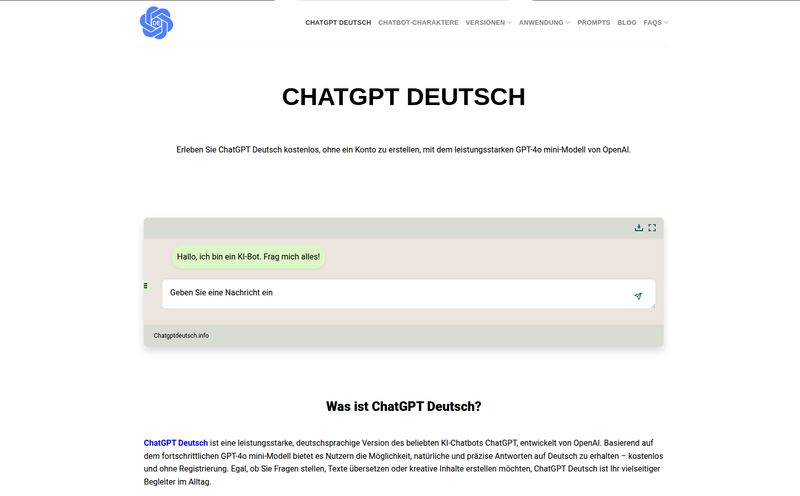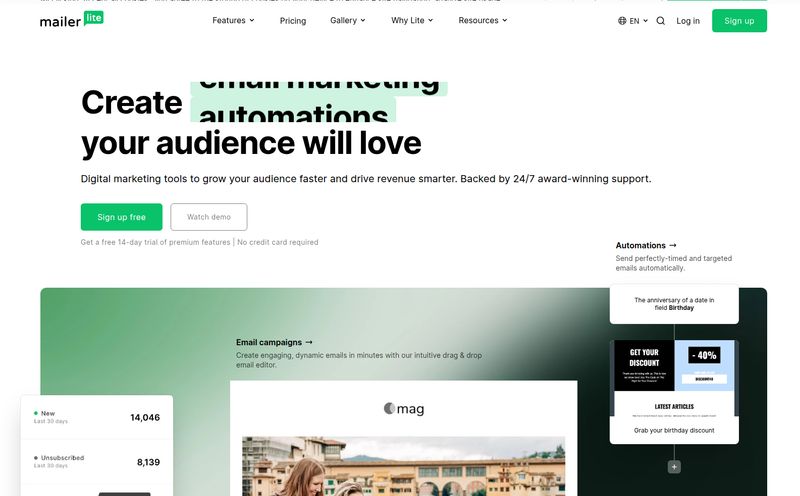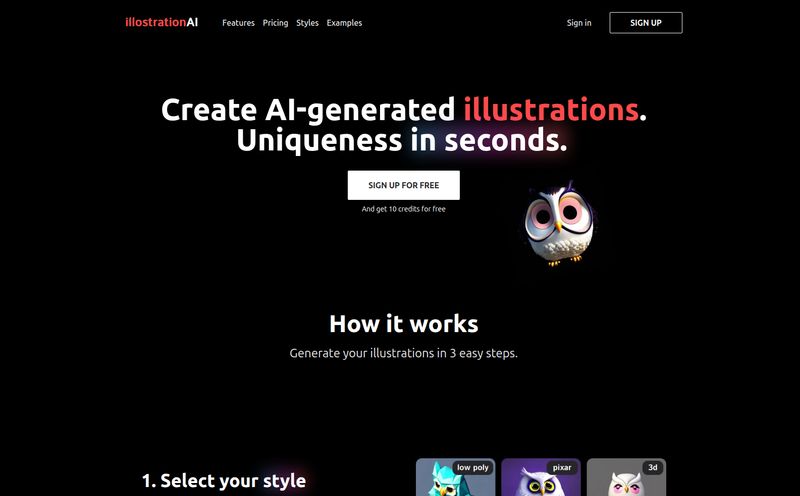I’ve been around the block a few times in this industry. I remember the dial-up screech, the absolute chaos of a MySpace page, and the pure, unadulterated joy of building my first website on Angelfire. It was terrible. A beautiful, pixelated, GIF-laden disaster. And it was mine. There was a magic to the early web—a sense of play and creation for creation’s sake. And lately, I've felt that's been missing.
Everything is so polished now, so optimized and market-tested. So when I stumbled across a tool called Websim, which pitches itself as a platform to create and share interactive games and web pages, my inner 90s kid sat up and paid attention. Could this be it? A return to fun? A digital sandbox without the pressure of building the next unicorn startup?
I decided to jump in, get my hands dirty, and see if Websim is just a fun distraction or a genuinely useful tool for aspiring creators. Let's get into it.
So, What’s the Deal with Websim Anyway?
Okay, first things first. Websim is a bit of a hybrid. It's not a full-blown website builder like a Wix or Squarespace, and it's not a complex game engine like Unity or Unreal. Think of it more like a set of digital LEGOs for the web. You get a bunch of pre-made pieces and templates, and you can stick them together to create simple, interactive experiences.
The platform is built around two core ideas:
- Creating stuff: This can be anything from a simple “click the button” game, a basic simulator, to an interactive, one-page website.
- Sharing and exploring: Everything you (and others) make is part of a larger community gallery. You can play other people’s games, see their creations, and get inspired.
It’s this community aspect that really gave me those old-school Flash portal vibes, like Newgrounds back in the day. It’s less about professional portfolios and more about a shared space for digital doodling.

Visit Websim
Jumping In: My First Impressions as a Creator
I’ve gotta say, getting started is refreshingly simple. There’s no 20-step setup process or a dashboard that looks like the inside of a space shuttle. The big draw here is the templates. Instead of a blank canvas, which can be terrifying, Websim gives you a starting point. I saw templates for basic games, simulators, and different web page layouts.
Being the nerd I am, I clicked on a 'Simulator' template. The interface was straightforward. It felt less like coding and more like filling in the blanks and tweaking settings. You can change text, upload images, and connect simple logic without writing a line of code. This is a huge win for anyone who finds the idea of HTML/CSS/JS intimidating. It lowers the barrier to entry so, so much. You can go from zero to having a functional, shareable little web app in under an hour. And that’s pretty cool.
More Than a Tool, It’s a Community Showcase
Once you’ve built your little masterpiece, you can publish it to the Websim community. And this is where the platform's personality really shines through. Exploring what other people have made is like walking through a digital arcade or an indie art gallery. You’ll find some genuinely clever ideas, some hilarious little games, and yeah, some stuff that’s just plain weird.
Websim seems to lean into this by featuring “Creator Spotlights,” which is a smart move. It encourages people to make cool things and gives everyone a chance to see what’s possible. It fosters a sense of discovery that you just don't get from more corporate tools. It’s a creator economy on a micro, more wholesome scale.
Let's Be Real: The Flip Side of Open Platforms
Now, it’s not all sunshine and rainbows. Any platform built on user-generated content (UGC) is bound to be a bit of a Wild West. And Websim is no exception. Let’s talk about the downsides.
- Quality is a Mixed Bag: For every creative gem you find, you’ll find five or six duds. That's just the nature of the beast. You have to be willing to sift through some rough stuff to find the diamonds.
- Potential for... Weirdness: When you give everyone a paintbrush, some people are going to paint something inappropriate. I didn’t see any specific info on their moderation policies, so that’s a bit of a question mark. It's a risk inherent to these open-style platforms.
- A Bit Vague on Features: While using it, I sometimes wished for more detailed documentation. Some of the more specific capabilities are not immediately obvious, and you have to learn by just clicking around and experimenting. Not a deal-breaker for a hobbyist, but something to be aware of.
Finding Your Fit: Who Should Use Websim?
So, who is this actually for? I don’t think Websim is trying to steal customers from Webflow. In my opinion, its strengths lie elsewhere.
| This is probably for you if... | You might want to look elsewhere if... |
|---|---|
| You're a student or educator looking for a fun tool for a class project. | You need to build a secure, scalable e-commerce site. |
| You're a hobbyist who just wants to build a fun little game to share with friends. | You're a professional developer who needs granular control over your code. |
| You want to prototype an interactive idea quickly without getting bogged down in code. | You need complex database integrations or third-party APIs. |
| You're feeling nostalgic for the creative, chaotic energy of the early web. | Your project requires a high degree of polish and corporate branding. |
It's a fantastic starting point. A 'gateway drug' to the world of web creation. It teaches the concepts of interactivity and design without the steep learning curve.
A Few Lingering Questions (FAQ)
Is Websim good for learning to code?
Indirectly, yes. While it's mostly a no-code platform, it's a great way to understand the logic and structure of interactive web apps. It can spark the curiosity that leads someone to learn HTML, CSS, and JavaScript. It's a fantastic first step.
Can I build a professional business website on Websim?
I wouldn't recommend it for a primary business site. It seems designed for single-page applications and games, not for complex, multi-page business websites that require things like advanced SEO, and robust contact forms.
How does Websim handle content moderation?
This is a bit of an unknown. Like most UGC platforms, they likely have a reporting system and terms of service. However, because of its open nature, you should be prepared for the possibility of encountering low-quality or strange content.
What kind of games can I make?
Based on the templates, you can create simple point-and-click games, text-based adventures, simulators, and quizzes. Don't expect to build the next Fortnite, but for creating fun, simple browser games, it seems quite capable.
Can I use a custom domain for my creation?
There's no information available on this. Typically, tools like this host creations on their own subdomain. The ability to use a custom domain is usually a premium feature, and since pricing isn't clear, I'd assume the answer is 'not at the moment.'
Final Thoughts: A Playground for the Web
So, what’s the final verdict on Websim? I like it. A lot. It's not a powerhouse, and it's not going to change the face of professional web development. And that's okay. That's not what it's trying to do.
Websim is a playground. It’s a throwback to a time when creating something on the internet was about expression and fun, not just commerce and clicks. It’s a tool that could get a whole new generation of kids excited about making things for the web, and frankly, we need more of that. It's imperfect, a little rough around the edges, and that's precisely what makes it charming.
If you’ve got a free afternoon and a quirky idea for a game or interactive page, I'd say give it a shot. It might just remind you why you fell in love with the web in the first place.
Reference and Sources
- A glimpse into the past: The Geocities Archive Project
- A modern tool for pro developers for comparison: CodePen
- The platform itself: Websim (Note: a direct link was not available at the time of writing).



